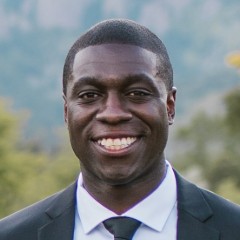 On February 19th, 2021, the Center for African Studies hosted its weekly Baraza entitled: “We Became Ghanaian: The Archive, Race, and the USSR.” The presentation was given by Dr. Nana Osei-Opare, an Assistant Professor of African and Cold War History at Fordham University, New York City. He currently working on a manuscript tentatively titled, Ghana’s Cold War: The Making of an African Citizen and State in the Cold War, 1957-1966. Ghana’s Cold War gives the first-ever comprehensive treatment of Ghana-Soviet relations and how those connections shaped Ghana’s political-economy, Pan-African program, and its modalities of citizenship during the Kwame Nkrumah era. His interest also lies in questions of historical methodology and sources and black political thought.
On February 19th, 2021, the Center for African Studies hosted its weekly Baraza entitled: “We Became Ghanaian: The Archive, Race, and the USSR.” The presentation was given by Dr. Nana Osei-Opare, an Assistant Professor of African and Cold War History at Fordham University, New York City. He currently working on a manuscript tentatively titled, Ghana’s Cold War: The Making of an African Citizen and State in the Cold War, 1957-1966. Ghana’s Cold War gives the first-ever comprehensive treatment of Ghana-Soviet relations and how those connections shaped Ghana’s political-economy, Pan-African program, and its modalities of citizenship during the Kwame Nkrumah era. His interest also lies in questions of historical methodology and sources and black political thought.
Dr. Osei-Opare began his talk by making a historical argument that racism and ill-treatment towards Ghanaians in the Soviet Union and present-day Russia were key to creating and shaping a global Ghanaian national consciousness. From this lens, Dr. Osei-Opare raised two points in relation to historical writing and methodology. The first being what he called post-colonial African archival pessimism and the second the connection between anti-black racism, white supremacy, and the historian’s subjectivity analytical framework to the archives.
He noted Ghana’s essential role it played in shaping historical global events from the 15th to 19th century as a major hub of the transatlantic. Framing the impact of British colonialism that in period and role in the transatlantic slave trade and gold trade. This being the reason the British called the area the colonial name of The Gold Coast. Dr. Osei-Opare then pointed out the momentous occasion of Ghana’s independence on March 6th, 1957. A signal to many blacks globally, in black wealth consciousness that the fight against racial and colonial oppression was succeeding. He notes that Black global leaders such as MLK, Louis Armstrong the African American Jazz star and the Caribbean and African Marxist George Padmore attending Ghana’s Independence Day.
Dr. Osei-Opare argued that with independence gained the process of nation and state-building went through a wide array of leaders. He transitioned to pointing out that with independence the economy relied on exporting goods such as cocoa, diamond, gold, and magnesium, where Britain and America dominated key positions and capital. This, Dr. Osei-Opare stated, is when Nkrumah started to create an industrialized socialist self-sufficient modern society that could break its strong dependence on British and American financial and human capital. In this capacity, the Ghanaian government sent government agencies in groups to inspect communist countries to forge political and economic ties with the world’s leading power. The Ghanaian in building this capital sent many students abroad to return back to aid in the state capitalist project and aid Ghana’s decoupling itself from colonial economies. Dr. Osei-Opare then shifts to the role of the Soviet Union’s aid in the vision Ghana had to reorient its economy.
Lastly, Dr. Osei-Opare transitioned to giving key examples of active racism and poor treatment against Ghanaians and how this forged a national consciousness. Giving examples of Ghanaian students relying on the embassy for support and justice against discrimination and injustice. He talked about the present experiences faced by black bodies in the Soviet Union and the cost awareness that is quadrupled in white spaces. He ended the talk with examples of black experiences of injustice and the inability of the government to grapple with race. Political agenda and the inability of an independent black government to protect its citizens against racism, Dr. Osei-Opare questioned what is the government’s purpose. Finally, he circled back to the tragedy of last year and George Floyd and the international lens that was warranted and brought to the forefront on anti-racism in all spheres of life.
Written by: Karen Awura-Adjoa Ronke Coker